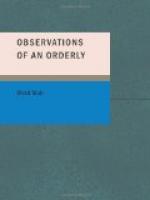the Press about the “shirkers” they think
they have detected, were of the opinion, long since,
that the R.A.M.C. should be combed out. Certain
journals made a great feature of this proposal.
Whatever may be the case elsewhere, I can only say
that as far as our unit was concerned it had already,
months before the newspaper agitation, been combed
out five times; and this in spite of the fact that,
at the period when I enlisted, our Colonel declined
to look at any recruit who was not either over age
or had been rejected for active service. The
unit was thus made up, even then, of elderly men and
of “crocks.” (This was before the start
of the Derby Scheme and, of course, considerably before
the introduction of Universal Service.) Perhaps it
is allowable to point the moral against the “shirker"-discovering
armchair patriots aforesaid: that no small proportion
of our unit was composed of over-age recruits who,
instead of informing the world at large that they
wished they were younger, “And, by Gad, I envy
the lads their chance to do
anything in the
country’s cause,” did not rest until they
had found an opening. In my own hut there were
two recruits over sixty years of age. Elsewhere
in the unit there were several over fifty. Our
mess-room at meal times was, and still is, dotted
with grey-haired heads, not of retired army men rejoined,
but of men who, previous to the war, had lived comfortable
civilian lives. At a later date, when the few
fit men that our combings-out revealed had gone elsewhere,
the unit was kept up to strength by the drafting-in
either of C3 recruits or of soldiers who, having been
at the front and been wounded, or invalided back, were
marked for home duty only. So much for the “slackers
in khaki” which one extra emphatic writer (himself
not in khaki, although younger than several of the
orderlies here) professed to discover in the R.A.M.C.
Those “slackers” may be having an easier
time of it than the heroes of France, Gallipoli, Salonika,
Egypt and Mesopotamia. But they are not having
so easy a time as some of their detractors.
The hospital orderly is not (I think I may assert
on his behalf) puffed up with foolish illusions as
to his place in the scheme of things. It is a
humble place, and he knows it. His work is almost
comically unromantic, painfully unpicturesque.
Moreover—let us be frank—much
of it is uninteresting, after the first novelty has
worn off. Work in the wards has its compensations:
here there is the human element. But only a portion
of a unit such as ours can be detailed for ward work:
the rest are either hewers of wood and drawers of
water or else have their noses to a grindstone of
clerical monotonousness beside which the ledger-keeping
of a bank employee is a heaven of blissful excitements.
You will find few hospital orderlies who are not “fed
up”; you will find none who do not long for
the war’s end. And I fancy you will find
very, very few who would not go on active service




